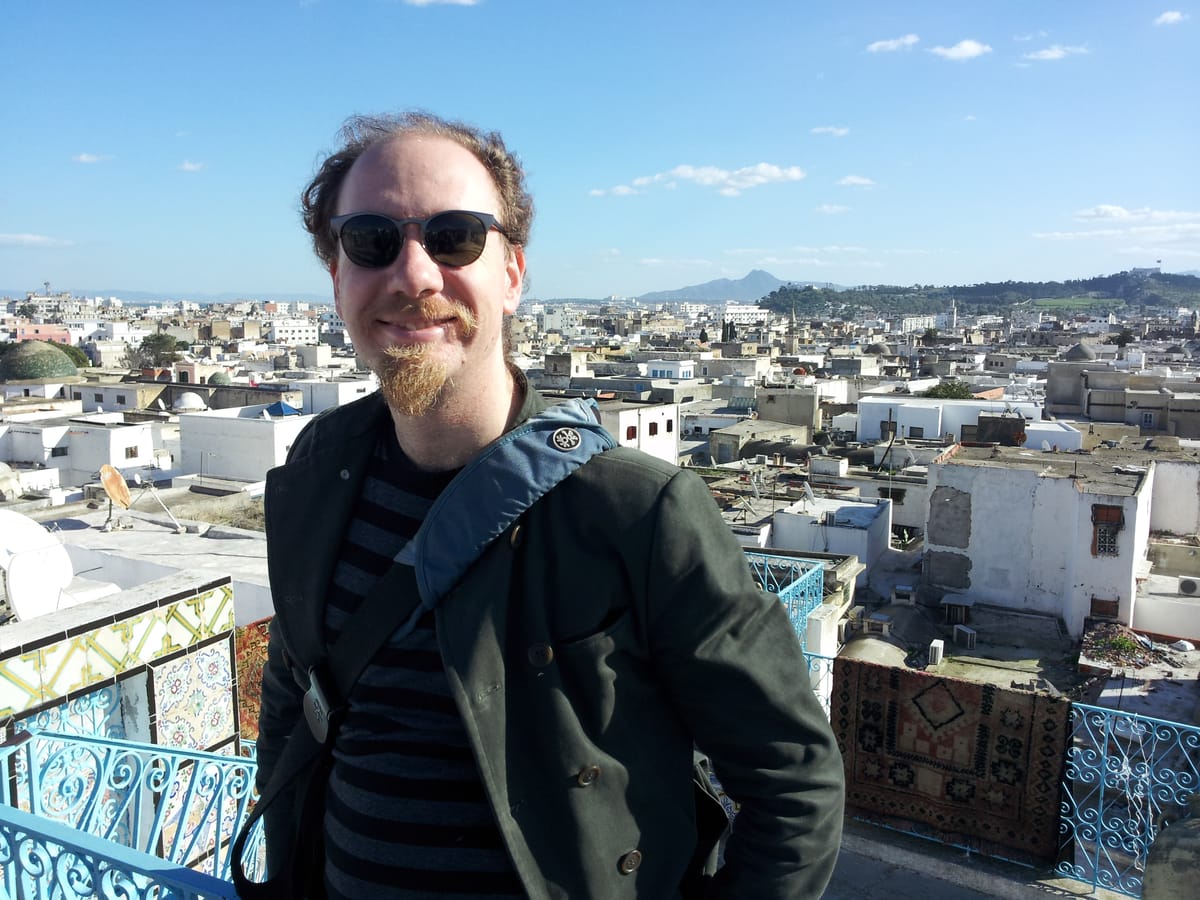Stories about Peter Eckersley

My friend Peter Eckersley tragically and unexpectedly died on Friday. I hadn't spent much time with him in the last few years, but I wish that I had because he had such a big impact on my life. Wikipedians have created an article about Peter, and Seth Schoen, who worked closely with me and Peter at EFF on the tech team, wrote a memorial for him on the Let's Encrypt forum. I thought I would share a few stories about Peter here.
We worked together at EFF for years, and for most of that time he was my manager. Peter encouraged my to switch career paths from being a web developer, where I wrote lots of PHP code to maintain EFF's Drupal website and instance of CiviCRM, to a staff technologist. As a technologist I took over the HTTPS Everywhere project, which Peter initially developed, and I got to do cool things like explain how HTTPS worked to journalists who were suddenly interested because of the Snowden revelations. (I had so many conversations with Peter about HTTPS and encrypting the web. The real problem wasn't something HTTPS Everywhere, which rewrote URLs from HTTP to HTTPS, could solve. The problem was the fact that the certificate authority cartel created an expensive barrier to entry to allow website to have basic security. This is why he cofounded Let's Encrypt, to remove the ridiculous cost burden and make the web more secure and private. And it worked.)
While working in EFF's office in the Mission district of San Francisco, we would regularly take breaks to get coffee at one of the many incredibly coffee shops that was an easy walk or bike ride away. Peter loved espresso drinks, and I also learned about his excellent policy regarding them: He would always take the time to enjoy his coffee, even if he was in a hurry. The negligible efficiency of getting coffee to go and walking it back to office just isn't worth it compared to spending five minutes to sit down and savor your cappuccino.
Peter taught me what entropy is (in the information theory sense of the term), and really about the field of information theory itself. I knew that password managers measured the strength of passwords in entropy, and that you can increase the entropy of your diceware passphrases by increasing the number of words, but I didn't really get it until he explained it to me. I loved this 2010 blog post he wrote called A Primer on Information Theory and Privacy which measured the number of bits of entropy it takes to uniquely identify someone. This was part of Peter's groundbreaking research in web browser fingerprinting, and the Panopticlick project (since renamed to Cover Your Tracks).
Peter was an avid road bicyclist. We road bikes all over San Francisco. Once, when we were both in Amsterdam (I think this was just after the outdoor hacker conference Observe. Hack. Make. in 2013) he had actually brought his fancy road bike to Europe with him, because he was planning on bike touring around afterwards. I had rented one of those cheap cruisers that are ubiquitous in Amsterdam. I remember we were near Centraal Station, surrounded by hundreds of bicyclists, and Peter was the only one wearing a helmet, which he had brought with him. Should he not wear his helmet, since no one else was? But he decided to wear it anyway regardless of what everyone else was doing. "That's not why I wear a helmet," he said.
After I married my wife Crystal in 2012 (I'm really glad that Peter was able to travel across the country to attend my wedding), we were both in something like $20,000 of credit card debt that seemed impossible to ever pay off. Peter had savings and hated the corrupt finance industry, and so he lent us $20k at an incredibly low interest rate. We immediately paid off all of our credit card debt, and then paid him back. Without Peter it would have taken us years longer to get out of debt. I also had a really low salary at EFF when I first started ($55k, though it was higher pay than I'd ever had before). Peter helped encourage me and prepare me to ask for a raise, the first time I had ever done so--and my salary went up to something like $75k.
Peter never made a Twitter account, but he kind of wanted one. The one thing stopping him was the username: @pde was already taken, and he decided he didn't want to make an account unless he could get the same three-letter username he used everywhere else.
Just as Peter was an espresso connoisseur, he was also a cocktail connoisseur. I'd never actually met anyone who was as knowledgeable about cocktails as Peter before, and he really made me understand why someone would spend $15 on one (I don't drink all that much). Cocktails can be like entrees at a fancy restaurant. I remember I was at a bar with him when he described, in intricate detail, what goes into a Manhattan. "After the whiskey, you add in the vermouth, which actually makes it less alcoholic, since vermouth has 15% alcohol and the whiskey has 40%."
Peter encouraged me to get better at programming in Python. Now it's my favorite language. When I was a teenager I first taught myself C++ and Perl and then quickly moved onto PHP/MySQL. For many years, as a web developer, I only programmed in PHP and JavaScript. When I started at EFF I knew a little Python (if you're proficient in one programming language you know a little of all of the rest) but PHP was still my go-to language. If a bash script I was writing started to get gnarly, I'd rewrite it in PHP. But Peter told me about how wonderful Python is at things like this compared to PHP. And how it was getting more popular and came pre-installed in every single Linux distro. He was right, Python is so much nicer than PHP, and a better tool for scripting. Since then I've programmed quite a lot of software in Python: Tor Browser Launcher, OnionShare, Dangerzone, and Semiphemeral. I'm writing a book right now that, among other things, teaches journalists and researchers to program in Python.
If you work at EFF for long enough you get a 2-month paid sabbatical. Right before Peter took his, a mysterious structure appeared on the roof of EFF's office (this time in the Tenderloin, EFF had moved from the Mission). It was a gazebo that was surprisingly large. We had staff meetings where the executive director was asking everyone wtf was up with it and why it was on the roof (apparently, you need permits from the city to add structures to the roof of your building in San Francisco). It turns out, Peter and some friends from Burning Man had built it there, I think maybe in the middle of the night, just before he left town for his sabbatical, lol.
Once, I was traveling to Tunisia for a post-Arab Spring internet freedom event with Peter. I don't exactly remember the itinerary, but I think we were flying from SFO to Spain, and then on to Tunis, but our flight to Europe showed up hours late and there was only one flight to Tunis from that airport each day. The only way to get there the same night would be to fly to Paris, and then much later in the night transfer to a flight to Tunis. So we went to Paris, and since we had like 6 hours before our flight we left the airport to explore--this is the only time I've ever been to Paris, or to anywhere in France. We visited Notre-Dame, and that bridge that lovers attach locks to, and we ate at a French restaurant. To my surprise, I learned that Peter was entirely fluent in French and could just talk to everyone. This also helped in Tunisia, where people mostly speak Arabic, French, and a little English.
He wasn't just fluent in French. He also triple-majored in college. He had three undergraduate degrees in physics, math, and computer science, and also a PhD in computer science and law--his dissertation was about copyright and piracy. Peter really helped Crystal, my wife, who never finished high school and was just learning early math in community college (now she has a BS in physics and is an applied math grad student), realize that STEM was a possibility for her.
Peter was good friends with Aaron Swartz, and they used to be roommates. After Aaron was indicted for bullshit Computer Fraud and Abuse Act charges, Peter dropped everything to organize an activism campaign at EFF in his defense. I never met Aaron myself, but I rushed to build an activism campaign website to collect signatures to send to Congress. But we never launched it, because Aaron committed suicide first. Peter, and the rest of EFF, then pushed for Aaron's Law, a bill to reform the CFAA, a goal that EFF still fights for.
I miss Peter. He was just 43 years old when he died, a huge loss for the internet and the world.
I took the photo of Peter at the top of this blog post on a rooftop in Tunis, Tunisia, in 2012. It's licensed Attribution 4.0 International (CC BY 4.0).
--
Update September 7, 2022: Last night, at Peter's beautiful memorial in San Francisco, I learned that he actually did create a Twitter account in 2015 with the username @pde33 – and I was surprised to find that I'm actually following him on Twitter! I must have forgotten. He posted the most interesting things about artificial intelligence.
So generative models dream up objects like this at the drop of a whimsical hat. Perhaps one day there will be a way to make them, so that our world is filled with such things? pic.twitter.com/wL9xLU2IDS
— Peter Eckersley (@pde33) June 28, 2022
